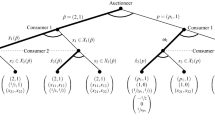Abstract
There are two theories for the treatment of market uncertainty: rationalizable expectations and sunspot equilibria. This paper shows how the game-theoretic solution concept of rationalizable expectations can be applied to an overlapping-generations exchange economy. Some general properties of these equilibria are discussed. It is shown that rationalizable-expectations equilibria are the predictions yielded by considering sunspot equilibria in which probability beliefs may differ across individuals. This result allows for a new interpretation of sunspot equilibria and helps to understand their relevance.
Similar content being viewed by others
References
Aumann, R. J. (1974): “Subjectivity and Correlation in Randomized Strategies.”Journal of Mathematical Economics 1: 67–96.
Azariadis, C., and Guesnerie, R. (1986): “Sunspots and Cycles.”Review of Economic Studies 53: 725–737.
Balkenborg, D. (1992): “The Properties of Persistent Retracts and Related Concepts.” Dissertation, Universität Bonn, Bonn, Germany.
Basu, K., and Weibull, J. W. (1991): “Strategy Subsets Closed under Rational Behavior.”Economics Letters 36: 141–146.
Benhabib, J., and Rustichini, A. (1994): “Introduction to the Symposium on Growth, Fluctuations, and Sunspots: Confronting the Data.”Journal of Economic Theory 63: 1–18.
Bernheim, B. D. (1984): “Rationalizable Strategic Behavior.”Econometrica 52: 1007–1028.
(1986): “Axiomatic Characterization of Rational Choice in Strategic Environments.”Scandinavian Journal of Economics 88: 473–488.
Brandenburger, A., and Dekel, E. (1987): “Rationalizability and Correlated Equilibria.”Econometrica 55: 1391–1402.
Cass, D., and Shell, K. (1983): “Do Sunspots Matter?”Journal of Political Economy 91: 193–227.
Forges, F., and Peck, J. (1991): “Correlated Equilibrium and Sunspot Equilibrium.”Economic Theory 5: 33–50.
Geanakoplos, J., and Polemarchakis, H. M. (1991): “Overlapping Generations.” InHandbook of Mathematical Economics, vol. 4, edited by W. Hildenbrand and H. Sonnenschein. Amsterdam: North-Holland.
Guesnerie, R. (1992): “An Exploration of the Eductive Justifications of the Rational Expectations Hypothesis.”American Economic Review 82: 1254–1278.
(1993a): “Alternative Theoretical Tests of the Rational Expectations Hypothesis in Economic Dynamical Models.”Journal of Economic Dynamics and Control 17: 847–864.
(1993b): “Successes and Failures in Coordinating Expectations.”European Economic Review 37: 243–268.
Heinemann, F. (1995a): “Closing Economic Models by Information Assumptions.” Discussion Paper 518-95, Institut für Volkswirtschaftslehre und Statistik, Universität Mannheim, Mannheim, Germany.
(1995b):Rationalisierbare Erwartungen: eine entscheidungstheoretische Fundierung ökonomischer und spieltheoretischer Gleichgewichtskonzepte. Heidelberg: Physica.
Lucas, R. E. Jr., and Prescott, E. C. (1971): “Investment under Uncertainty.”Econometrica 39: 659–681.
Luce, R. D., and Raiffa, H. (1957):Games and Decisions. New York: John Wiley.
McAllister, P. (1988): “Rational Behavior and Rational Expectations.” Technical Report 535, Institute for Mathematical Studies in the Social Sciences, Stanford University, Stanford, CA.
Morgenstern, O. (1935): “Vollkommene Voraussicht und wirtschaftliches Gleichgewicht.”Zeitschrift für Nationalökonomie 6: 337–357.
Muth, J. F. (1961): “Rational Expectations and the Theory of Price Movements.”Econometrica 29: 315–335.
Pearce, D. G. (1984): “Rationalizable Strategic Behavior and the Problem of Perfection.”Econometrica 52: 1029–1050.
Radner, R. (1979): “Rational Expectations Equilibrium: Generic Existence and the Information Revealed by Prices.”Econometrica 47: 655–678.
Shapley, L., and Shubik, M. (1977): “Trade Using One Commodity as a Means of Payment.”Journal of Political Economy 85: 937–968.
Shell, K. (1987): “Sunspot Equilibrium.” InThe New Palgrave: a Dictionary of Economics, vol. 4. London: Macmillan.
Tan, T., and Werlang, S. (1988): “The Bayesian Foundations of Solution Concepts of Games.”Journal of Economic Theory 45: 370–391.
Author information
Authors and Affiliations
Rights and permissions
About this article
Cite this article
Heinemann, F. Rationalizable expectations and sunspot equilibria in an overlapping-generations economy. Journal of Economics Zeitschrift für Nationalökonomie 65, 257–277 (1997). https://doi.org/10.1007/BF01226845
Received:
Revised:
Issue Date:
DOI: https://doi.org/10.1007/BF01226845




